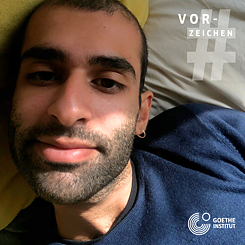Book Review #4
Armin reads 'Da waren Tage'
Armin’s new book review for #Vorzeichen: A world between dream and reality and an unconventional writing style. Here is his review of Luna Ali’s debut novel, Da waren Tage [Those Were Days].
March 15 won’t be a normal day for Aras anymore. In Luna Ali’s debut novel, Da waren Tage [Those Were Days] we accompany a young law student, year by year, on paths through both his city and his fantasy—from 2011 into the future. Together with his mother, he organizes demonstrations protesting the Syrian government’s use of torture, writes lost friends from his childhood, and comes suddenly to represent an entire generation through appearances on bizarre talk shows. We follow Aras for nearly a decade—each chapter, a year—until the interlude which is followed by a dreamlike glimpse into the year 4020.
As revealed in the book trailer, the language
of the novel develops alongside Aras between reality and dream. At first uncertain how to do justice to his Syrian and Kurdish comrades, he daydreams of being in their proximity. He sees
bombs falling in his panic attacks, sees a stranger in his longtime girlfriend. Aras’ sentences exchange subject and object, force us in one chapter to turn the book around and read his encounters from the side, combining UN resolution numbers with the names of resistance fighters. Lists of Syrian military officers between the names of their torture prisons. Historical contexts arise again and again, moments in which Ali elucidates relations between high-ranking Nazi officials training Syrian secret police. The ending reveals perhaps an attempt to release the many voices in Ara’s head—to face the ‘specter’ in the chapter heading. A novel that actually forms a collage and which might lose its intrigue without these many excursions into fantasy.
Luna Ali inspires through the many layers of her debut novel, the clever combination of facts, poetry, and prose fragments. The lyric passages resonate most for me—moments in which Aras at once appears to process the brutality of the Syrian regime and his own personal quest.
As revealed in the book trailer, the language
of the novel develops alongside Aras between reality and dream. At first uncertain how to do justice to his Syrian and Kurdish comrades, he daydreams of being in their proximity. He sees
bombs falling in his panic attacks, sees a stranger in his longtime girlfriend. Aras’ sentences exchange subject and object, force us in one chapter to turn the book around and read his encounters from the side, combining UN resolution numbers with the names of resistance fighters. Lists of Syrian military officers between the names of their torture prisons. Historical contexts arise again and again, moments in which Ali elucidates relations between high-ranking Nazi officials training Syrian secret police. The ending reveals perhaps an attempt to release the many voices in Ara’s head—to face the ‘specter’ in the chapter heading. A novel that actually forms a collage and which might lose its intrigue without these many excursions into fantasy.
Luna Ali inspires through the many layers of her debut novel, the clever combination of facts, poetry, and prose fragments. The lyric passages resonate most for me—moments in which Aras at once appears to process the brutality of the Syrian regime and his own personal quest.


